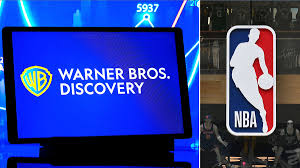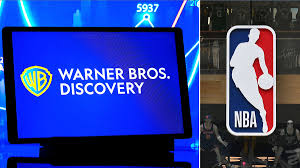
In an attempt to keep the broadcast rights for a series of live games, Warner Bros. Discovery has filed a lawsuit against the NBA.
The company's TNT Sports division released a statement saying, "We have taken legal action to enforce our rights, given the NBA's unjustified rejection of our matching of a third-party offer." "We firmly believe that this is not only in the best interests of our fans, who have the choice and flexibility to continue watching our industry-leading NBA content through our widely distributed WBD video-first distribution platforms, including TNT and Max, but also in accordance with our contractual rights."
In an attempt to gain financial gain, the media corporation wants to stop the NBA from giving the rights to Amazon, whose gaming package Warner Bros. Discovery attempted to match.
The NBA ended its almost 40-year contract with Warner Bros. Discovery's Turner Sports on Wednesday, announcing agreements with Disney, Comcast's NBCUniversal, and Amazon on three separate game packages. With the value of live sports skyrocketing, the 11-year media rights pact is estimated to be worth $77 billion, a significant increase over the previous contract.
NBA spokesperson Mike Bass responded to the lawsuit by saying, "Warner Bros. Discovery's claims are without merit and our lawyers will address them."
Warner Bros. Discovery announced earlier this week that it has filed the necessary paperwork with the league to match one of the packages. Those with knowledge of the situation identified this package as the $1.8 billion group of games that Amazon was set to get annually.
Regular-season games, the in-season tournament, and a few playoff games are all included in the contract with the tech giant.
When Warner Bros. Discovery inked its prior media agreement with the NBA in 2014, the NBA awarded it matching rights. The clause aims to provide an established business the last say in preserving its status as a media partner.
But the league said on Wednesday that the matching rights are void because to Warner Bros. Discovery's choice to match the Amazon package instead of the $2.5 billion-a-year NBCUniversal deal. The NBA games would be televised on Warner Bros. Discovery's cable network TNT and simulcast on its streaming service Max as part of that package. The league contended that comparing it to Amazon Prime Video—a streaming-only service—is not a fair comparison.
In a court filing on Friday, Warner Bros. Discovery contended that since many of the games in the Amazon package were originally shown on cable TV, its matching rights should still be applicable. “The MRE (Matching Rights Exhibit) further provides that, ” ]n the event that TBS Matches a Third Party Offer that includes Cable Rights” and no other Incumbent matches, then TBS shall have the exclusive right and obligation to exercise the Cable Rights provided for (and on the same terms set forth) in the Third Party Offer,” Warner Bros. Discovery wrote in its court filing. “That is exactly what happened here: Amazon made an offer for Cable Rights as defined in the MRE, and TBS matched it. But, in breach of the Agreement, the NBA has refused to honor TBS’s match.” TBS is a cable TV network owned by Warner Bros. Discovery.
The NBA rejected the offer on Wednesday, citing the contractual language of the 2014 matching rights as justification. The NBA delivered a letter to Warner Bros. Discovery detailing its decision.
According to the NBA, if an incumbent matches a third party offer that allows for the exercise of game rights via a particular form of combined audio and video distribution, that incumbent will only be able to exercise those game rights through that specific form of distribution (for example, if the specific form of combined audio and video distribution is internet distribution, the matching incumbent will not be able to exercise those game rights via television distribution)."
David Zaslav, the CEO of Warner Bros. Discovery, stated in 2022 that his business does not "have to have the NBA" if the financials weren't good.
"We're a renter with sport," Zaslav declared during an investor meeting in November 2022. "It's not a very good business."
Nevertheless, Friday's complaint elaborated on Turner Sports' appreciation of the NBA. The existence of NBA rights is important for Warner Bros. Discovery's cable TV division, which has struggled recently as millions of customers have abandoned traditional pay TV in favour of streaming service bundles.
“NBA games drive significant viewership and ratings, as consumers are more likely to watch games live, in real time. This, in turn, affects the price TBS and WBD can charge to their advertisers and downstream distributors that license TNT for transmission to their customers,” the company wrote in the complaint. “NBA distribution rights thus give both TBS and WBD the ability to grow their brands and reach a larger group of consumers that only NBA games bring. NBA telecast rights also give TBS and WBD a competitive advantage over other programmers, particularly when negotiating with other leagues for sports rights.”
Warner Bros. Discovery claimed that the NBA provides the company with "intangible and incalculable benefits" and requested "preliminary and permanent injunctive relief to prohibit the NBA from licensing these unique and irreplaceable rights [to Amazon]". The company also stated that it anticipates receiving "monetary damages" from the NBA in the event that "equitable relief is not granted."
(Source:www.usatoday.com)
The company's TNT Sports division released a statement saying, "We have taken legal action to enforce our rights, given the NBA's unjustified rejection of our matching of a third-party offer." "We firmly believe that this is not only in the best interests of our fans, who have the choice and flexibility to continue watching our industry-leading NBA content through our widely distributed WBD video-first distribution platforms, including TNT and Max, but also in accordance with our contractual rights."
In an attempt to gain financial gain, the media corporation wants to stop the NBA from giving the rights to Amazon, whose gaming package Warner Bros. Discovery attempted to match.
The NBA ended its almost 40-year contract with Warner Bros. Discovery's Turner Sports on Wednesday, announcing agreements with Disney, Comcast's NBCUniversal, and Amazon on three separate game packages. With the value of live sports skyrocketing, the 11-year media rights pact is estimated to be worth $77 billion, a significant increase over the previous contract.
NBA spokesperson Mike Bass responded to the lawsuit by saying, "Warner Bros. Discovery's claims are without merit and our lawyers will address them."
Warner Bros. Discovery announced earlier this week that it has filed the necessary paperwork with the league to match one of the packages. Those with knowledge of the situation identified this package as the $1.8 billion group of games that Amazon was set to get annually.
Regular-season games, the in-season tournament, and a few playoff games are all included in the contract with the tech giant.
When Warner Bros. Discovery inked its prior media agreement with the NBA in 2014, the NBA awarded it matching rights. The clause aims to provide an established business the last say in preserving its status as a media partner.
But the league said on Wednesday that the matching rights are void because to Warner Bros. Discovery's choice to match the Amazon package instead of the $2.5 billion-a-year NBCUniversal deal. The NBA games would be televised on Warner Bros. Discovery's cable network TNT and simulcast on its streaming service Max as part of that package. The league contended that comparing it to Amazon Prime Video—a streaming-only service—is not a fair comparison.
In a court filing on Friday, Warner Bros. Discovery contended that since many of the games in the Amazon package were originally shown on cable TV, its matching rights should still be applicable. “The MRE (Matching Rights Exhibit) further provides that, ” ]n the event that TBS Matches a Third Party Offer that includes Cable Rights” and no other Incumbent matches, then TBS shall have the exclusive right and obligation to exercise the Cable Rights provided for (and on the same terms set forth) in the Third Party Offer,” Warner Bros. Discovery wrote in its court filing. “That is exactly what happened here: Amazon made an offer for Cable Rights as defined in the MRE, and TBS matched it. But, in breach of the Agreement, the NBA has refused to honor TBS’s match.” TBS is a cable TV network owned by Warner Bros. Discovery.
The NBA rejected the offer on Wednesday, citing the contractual language of the 2014 matching rights as justification. The NBA delivered a letter to Warner Bros. Discovery detailing its decision.
According to the NBA, if an incumbent matches a third party offer that allows for the exercise of game rights via a particular form of combined audio and video distribution, that incumbent will only be able to exercise those game rights through that specific form of distribution (for example, if the specific form of combined audio and video distribution is internet distribution, the matching incumbent will not be able to exercise those game rights via television distribution)."
David Zaslav, the CEO of Warner Bros. Discovery, stated in 2022 that his business does not "have to have the NBA" if the financials weren't good.
"We're a renter with sport," Zaslav declared during an investor meeting in November 2022. "It's not a very good business."
Nevertheless, Friday's complaint elaborated on Turner Sports' appreciation of the NBA. The existence of NBA rights is important for Warner Bros. Discovery's cable TV division, which has struggled recently as millions of customers have abandoned traditional pay TV in favour of streaming service bundles.
“NBA games drive significant viewership and ratings, as consumers are more likely to watch games live, in real time. This, in turn, affects the price TBS and WBD can charge to their advertisers and downstream distributors that license TNT for transmission to their customers,” the company wrote in the complaint. “NBA distribution rights thus give both TBS and WBD the ability to grow their brands and reach a larger group of consumers that only NBA games bring. NBA telecast rights also give TBS and WBD a competitive advantage over other programmers, particularly when negotiating with other leagues for sports rights.”
Warner Bros. Discovery claimed that the NBA provides the company with "intangible and incalculable benefits" and requested "preliminary and permanent injunctive relief to prohibit the NBA from licensing these unique and irreplaceable rights [to Amazon]". The company also stated that it anticipates receiving "monetary damages" from the NBA in the event that "equitable relief is not granted."
(Source:www.usatoday.com)














